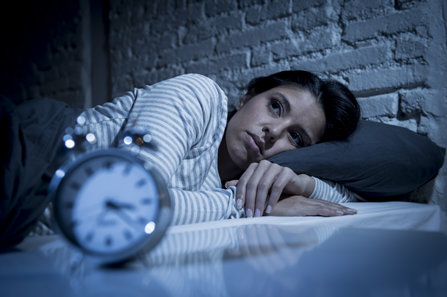Alcohol and Sleep

Have you ever noticed how tired and worn-out people who drink too much alcohol often look?
A new study reveals that alcohol abusers could be losing sleep due to their drinking, but for different reasons than you might think. The tossing and turning at night may not just be from worry over life problems created by over drinking. Now there is evidence that alcohol can have a direct biological effect on sleep.
Evidence suggests that alcohol contributes to sleep disorders, adding just one more adverse phenomenon to the long list of harmful effects of alcohol use. Not only do alcohol addicts have to contend with the detrimental effects of alcohol (of which there are many), but they must also contend with the adverse physiological effects of a sleep disorder (which comes with its own long list of harmful effects).
How does alcohol affect sleep? And what are the harmful effects of an alcohol-caused sleep disorder?
A Look at the Data
A new study reveals that about 7 in 10 Americans who drink to excess and who drink too close to bedtime reported trouble sleeping on the night that they consumed alcohol. One in five Americans who overdrink report consistent and frequent sleeping difficulties.
The biological explanation for this is easy to understand. According to the same study, drinking alcohol an hour before bedtime reduces melatonin production. And that can disrupt the internal clock that helps the body regulate the sleep cycle. The result? Insufficient sleep.
In addition to reducing melatonin production, drinking alcohol can cause sleep disorders or worsen existing sleep disorders (like sleep apnea and insomnia). Overdrinking can also cause excessive relaxation in the head, neck and throat, which can interfere with normal breathing patterns during sleep. Additionally, overdrinking makes for frequent midnight bathroom trips, next-day fatigue, sleepwalking and sleep eating.
“While you might think alcohol helps you sleep, there are negative effects to having a drink close to bedtime. Alcohol use can fragment your sleep, leading to more frequent awakenings during the second half of the night.”
According to the American Academy of Sleep Medicine President Dr. Kannan Ramar, “While you might think alcohol helps you sleep, there are negative effects to having a drink close to bedtime. Alcohol use can fragment your sleep, leading to more frequent awakenings during the second half of the night.”
The researchers concluded that, while alcohol consumption initially promotes sleep, too much consumption and chronic alcohol consumption leads to sleep disruption, insufficient rest and sleep disorders. Even moderate drinking can cause sleep problems in some people. Quoting study authors Stein and Friedmann, “Behavioral studies suggest that up to 2 to 3 standard drinks before bedtime initially promotes sleep, but these effects diminish in as few as 3 days of continued use. In low to moderate doses, alcohol initially promotes sleep. However, scientific consensus maintains that chronic use ultimately disrupts sleep-related physiology, even among those who do not meet diagnostic criteria for alcohol dependence.”
Those study authors are not the only experts who have reported on this issue. Quoting Danielle Pacheco with the Sleep Foundation, “Alcohol may aid with sleep onset due to its sedative properties, allowing you to fall asleep more quickly. However, people who drink before bed often experience disruptions later in their sleep cycle as liver enzymes metabolize alcohol. This can also lead to excessive daytime sleepiness and other issues the following day. Furthermore, drinking to fall asleep can build a tolerance, forcing you to consume more alcohol each successive night in order to experience the sedative effects.” Pacheco’s research covers and documents a long list of sleep disruptions and sleep-related deprivation issues from drinking alcohol.
Alcohol Consumption Causes Physical Harm
Insufficient sleep is just one of the many harmful effects of alcohol consumption. According to the National Institute on Alcohol Abuse and Alcoholism, about 14.1 million adults in the U.S. meet the criteria for alcohol addiction, with about 25 percent of Americans admitting binge drinking at least once per month. These concerning numbers show just how prevalent alcohol misuse is. About 95,000 people die from alcohol-related causes each year, with alcohol being the third-leading cause of preventable death in the U.S.

In addition to sleep difficulties, alcohol consumption harms just about every area and system within the body. Here are just a few examples of the damage that alcohol can cause to the body:
- The brain: Alcohol interferes with the brain’s communication pathways, hampering neurological function, judgment, cognitive skills and mood behavior.
- The heart: Drinking to excess over time (or even in just one instance) harms the heart. From stroke risk to high blood pressure, cardiomyopathy and arrhythmias, excessive drinking creates severe heart risk.
- The liver: Because the liver processes alcohol, it can be harmed significantly by excessive drinking. Cirrhosis of the liver is the most common liver-related effect of alcohol consumption, but steatosis, alcoholic hepatitis and fibrosis are also issues.
- The pancreas: Alcohol causes the pancreas to produce toxic substances, leading to dangerous inflammation and swelling of blood vessels.
- Cancer: Alcohol has been linked to cancers such as head and neck cancer, esophageal cancer, liver cancer, breast cancer and colorectal cancer.
Additionally, alcohol affects the immune system (particularly relevant considering the current COVID-19 pandemic). Quoting NIAAA authors, “Chronic drinkers are more liable to contract diseases like pneumonia and tuberculosis than people who do not drink too much. Drinking a lot on a single occasion slows your body’s ability to ward off infections—even up to 24 hours after getting drunk.”
Getting Help for a Drinking Problem
If you know someone who is losing sleep due to alcohol use, that person needs your help. There is no such thing as “safe drinking” or “normal amounts of alcohol consumption,” and no amount of drinking should be encouraged or promoted. Finally, drinking in such a way that it hinders one’s sleep is indicative of a drinking problem.
Alcohol addiction does not improve on its own—it only ever gets worse. Make sure your loved one receives needed help.
Sources:
- https://www.ncbi.nlm.nih.gov/pmc/articles/PMC2775419/
- https://www.usnews.com/news/health-news/articles/2020-11-28/booze-robbing-many-americans-of-their-sleep
- https://www.sleepfoundation.org/nutrition/alcohol-and-sleep
- https://www.niaaa.nih.gov/publications/brochures-and-fact-sheets/alcohol-facts-and-statistics
- https://www.niaaa.nih.gov/alcohols-effects-health/alcohols-effects-body


 ®
®